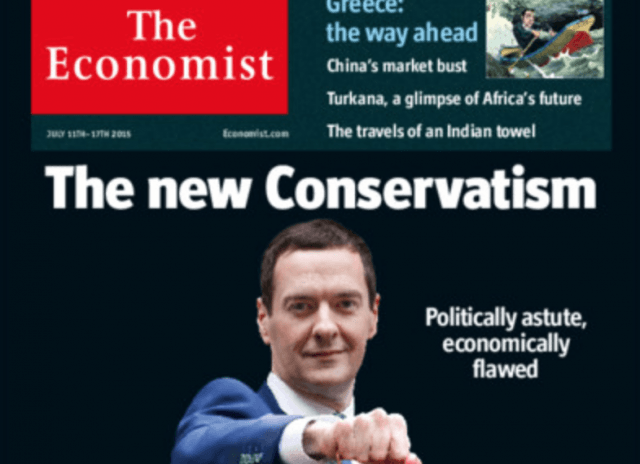The Economist magazine this week splashes on Chancellor George Osborne’s budget, with the headline “The New Conservatism: George Osborne’s political vision is brave, bold—and on many counts wrong”.
It read (emphasis added):
On July 8th Mr Osborne rose to give the budget—his seventh, and the first by a majority Conservative government in 19 years—and outline what he called a “new settlement” for Britain (see article). He announced plans to cut the deficit further, while trimming rates for business, slashing inheritance tax and furthering radical devolution to England’s neglected cities. Boldest of all, he declared an overhaul of the welfare system, replacing benefits with a higher minimum wage. With this, and measures to raise the personal tax allowance and double free child care for parents, he marched his party onto ground once considered too left wing even for Labour.
…
This is radical—especially from a Tory government—but it is mistaken. Minimum wages do little harm when low, but create unemployment as they rise—indeed, Mr Osborne admitted that the higher wage floor would cost 60,000 jobs. Tax credits, by contrast, are an incentive to hiring. Some complain that they subsidise employers, but around three-quarters of the benefit goes to employees. Despite its fanfare, the new “living wage” is fairly modest. But swapping tax credits for minimum wages as a policy for alleviating poverty could do enormous damage in a world where firms are increasingly buying technology rather than paying workers. Ask France, with a generous minimum wage—and joblessness of more than 10%.
…
It was a beguiling budget: policies of the left given a Conservative justification, and cuts recast as a reshaping of the state. In the past five years Mr Osborne has played a dreadful hand well. But this was a budget built on economic mistakes. The chancellor’s revamped Conservatism is characteristically daring. Economically, it is disappointingly thin.

COMMENTS
Please let us know if you're having issues with commenting.